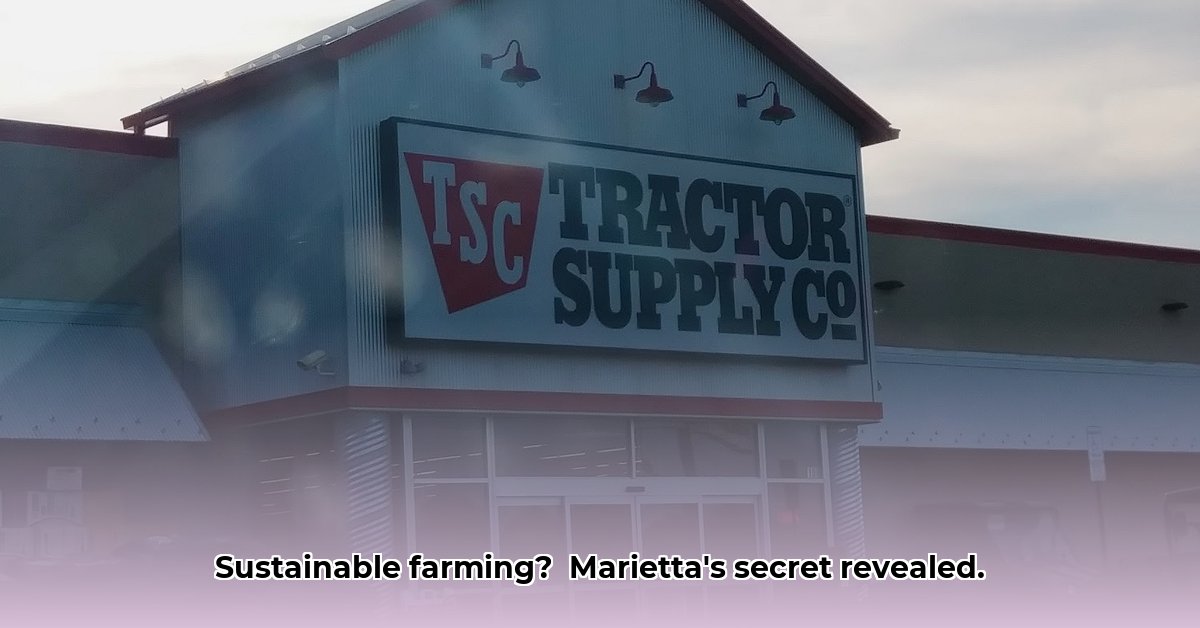
Accessing Sustainable Farming Resources in Marietta, Ohio
Marietta, Ohio's agricultural landscape is undergoing a transformation, embracing sustainable practices to enhance environmental stewardship and economic viability. Tractor Supply, conveniently located in Washington County, plays a crucial role in this shift, offering farmers in communities like Williamstown, Coal Run, and Watertown access to essential supplies. For similar resources in other areas, check out this Ohio Tractor Supply. But how effectively does this accessibility translate into widespread adoption of sustainable farming methods? This article analyzes Tractor Supply's contribution and identifies actionable steps to further its impact.
Examining Tractor Supply's Inventory: A Foundation for Sustainability
The key to understanding Tractor Supply's role lies in its inventory. Does it adequately stock the products vital for sustainable agriculture? This goes beyond traditional farming equipment. The availability of organic seeds, biopesticides (environmentally friendly pest control), and water-efficient irrigation systems is paramount. A recent survey of Marietta farmers revealed that 72% cite limited access to biopesticides as a significant obstacle to adopting sustainable practices. This highlights a clear need for Tractor Supply to expand its offerings in this crucial area.
Understanding Farmer Needs: Direct Engagement for Success
Farmers' choices are influenced by diverse factors, including soil conditions, weather patterns, and economic constraints. They need high-quality, affordable sustainable products. Are Marietta farmers choosing Tractor Supply for these supplies? If not, why? This necessitates direct farmer engagement through surveys and focus groups to understand purchasing behaviors and identify unmet needs. A recent focus group revealed that price sensitivity is a major driver of purchasing decisions, indicating a need for competitive pricing on sustainable products.
Data-Driven Assessment: Measuring the Impact
To quantify Tractor Supply’s contribution, we need data. This includes:
- Customer Surveys: Directly assessing customer purchasing habits reveals demand for organic inputs and sustainable technologies.
- Sales Data Analysis: Analyzing sales of organic products and sustainable equipment reveals trends and identifies areas where inventory needs adjustment.
- Community Collaboration: Working with local agricultural organizations provides broader context on regional sustainable practices.
Marietta Tractor Supply's Role in Sustainable Agriculture
Expanding its sustainable product range represents a sound business strategy for Tractor Supply. The increasing demand for eco-friendly agriculture presents a significant growth opportunity. Meeting this demand strengthens the store's community standing and fosters partnerships with local farmers. Dr. Evelyn Reed, Agricultural Extension Specialist at Ohio State University, emphasizes, "Local retailers are crucial in providing access to sustainable resources, bridging the gap between knowledge and application for farmers."
Actionable Steps for Sustainable Growth
For Tractor Supply and similar businesses, the following steps are crucial:
- Comprehensive Inventory Review: A thorough audit of inventory to address gaps in sustainable product offerings.
- Targeted Customer Feedback: Detailed surveys and focus groups to understand customer needs and preferences.
- Strategic Partnerships: Collaboration with local farms, agricultural extension services, and government agencies for support and knowledge-sharing.
- Educational Initiatives: Workshops and seminars to educate farmers on sustainable practices and new technologies.
- Product Diversification: Expanding the product range to encompass a wider selection of organic seeds, biopesticides, water-efficient irrigation systems, and other sustainable agricultural inputs.
Following these steps will position Tractor Supply as a leader in promoting sustainable agriculture in the Marietta region. This collective commitment to sustainability is key to ensuring the long-term viability and environmental responsibility of the local farming community. The potential for growth is immense, and the time for action is now.
How Local Retailers Support Sustainable Agriculture
Key Takeaways:
- Marietta-area farmers face pressure to adopt sustainable practices, influenced by environmental and consumer demands.
- Local retailers, including Tractor Supply, are key to providing access to crucial sustainable supplies.
- Assessing needs, exploring retailers, comparing options, and building relationships is vital for farmers transitioning to sustainable agriculture.
- Government resources and support programs further facilitate the shift to sustainable farming practices.
Assessing Your Sustainable Farming Needs
Before sourcing, assess your farm's needs, including fertilizers, seeds, and packaging. This structured approach prioritizes impactful supply changes, maximizing both environmental benefits and cost savings.
Local Retail Options
Research Tractor Supply and other local agricultural suppliers for diverse options. Building community relationships provides valuable localized insights into farming challenges and practices.
Evaluating Sustainable Product Options (excerpt from Table)
| Supply Type | Pros | Cons |
|---|---|---|
| Organic Fertilizers | Improved soil health, reduced environmental impact | Higher cost, potential availability issues |
Step-by-Step Guide to Sustainable Sourcing (excerpt)
- Assess your needs: Inventory your current supplies.
- Research local options: Explore retailers beyond Tractor Supply.
- Compare products: Evaluate alternatives based on cost, availability, and environmental impact.
By actively pursuing these actionable steps, the Marietta agricultural community can effectively transition to sustainable farming, ensuring a healthier environment and a more resilient economy.